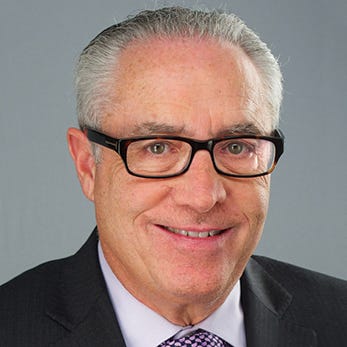
Feds May Turn Wealth Advisors Into SnitchesFeds May Turn Wealth Advisors Into Snitches
The feds may soon try to turn wealth advisors into snitches. But first the IRS is offering a deal if taxpayers come clean before Sept. 23, 2009. The world’s financial system is getting tied more tightly together — making it far more difficult to hide money anywhere in the world. And, take note, some countries are forcing wealth management advisors to report on their clients. So, if your clients are hiding anything, now is an excellent time to help them make it right.
Gideon Rothschild, partner, Moses & Singer LLP, New York
The feds may soon try to turn wealth advisors into snitches. But first the IRS is offering a deal if taxpayers come clean before Sept. 23, 2009.
The world’s financial system is getting tied more tightly together — making it far more difficult to hide money anywhere in the world. And, take note, some countries are forcing wealth management advisors to report on their clients. So, if your clients are hiding anything, now is an excellent time to help them make it right.
The Internal Revenue Service on March 23, 2009, issued a memorandum announcing a new procedure for voluntary disclosure of offshore accounts.
There’s always been a voluntary compliance program: wayward taxpayers could throw themselves on the Service’s mercy and, on a case-by-case basis, the Service would decide whether to prosecute. That set up made it hard for clients to step forward. They didn’t know whether they’d be prosecuted—or what other penalties there might be.
But from now until Sept. 23, 2009, clients can come clean, report income from offshore accounts—and pay the additional tax due plus interest, a 20 percent accuracy-related penalty and an additional penalty of 20 percent on the highest amount in the account in the last six years. (If the taxpayer made no deposits or withdrawals during the six-year period, the penalty may be reduced to 5 percent.)
The taxpayer’s offer will be accepted provided that: (1) the taxpayer fully cooperates; (2) the funds are not from illegal sources; and (3) his disclosure is timely (for example, no investigation has already commenced).
The Service will not guarantee that it won’t recommend criminal prosecution; but, in most cases, it’s unlikely that the IRS would, because doing so would result in few taxpayers coming clean.
At first blush, this may not sound like a great deal. If you have a client with $10 million offshore, he’ll pay a $2 million penalty on top of any taxes, interest and other penalties due.
Still, it’s a cheap price to pay. The alternative would be a 50 percent penalty for every year he’d failed to report a bank account as well as other penalties for failure to file a myriad of other returns—including Forms 5471 and 3520 if trusts or foreign entities are involved. And that’s not even mentioning additional potential civil and criminal fraud penalties.
Let’s face it: Some people have inherited offshore accounts that were never reported on estate tax returns and, for a very long time, they’ve been afraid to move the money back to the United States. The sheer relief of moving that money into the system may be priceless.
U.S. VERSUS UBS
This “amnesty” program comes just in the nick of time. Just look at the fight between UBS AG, the world’s largest bank, over accounts in Switzerland, the world’s largest offshore tax haven.
The U.S. government sued UBS to force disclosure of the identities of as many as 52,000 U.S. customers who allegedly hid their Swiss accounts from the U.S. tax authorities. The suit, filed in federal court in Miami on Feb. 19, 2009, alleges these customers failed to report and pay U.S. taxes on income earned in 32,940 accounts, which held about $14.8 billion in assets during the middle of this decade.
According to The New York Times, the Justice Department has as many as 100 criminal investigations against U.S. customers of UBS. The bank already has turned over more than 250 names to the U.S. government. The Times reports that UBS reached a $780 million deferred-prosecution agreement to settle accusations it used private banking services to help wealthy Americans evade taxes.
Already, a Florida accountant—Steven Michael Rubinstein—has been criminally charged with false income tax return based on those UBS client records. More actions against more customers are promised.
FORCED TO SNITCH
If these news reports don’t put the fear of the U.S. tax authorities into clients with offshore accounts and their advisors, consider this: Many types of wealth advisors soon may be required—that’s right, required—to report clients who are evading taxes.
Sometime later this year, guidelines and maybe even laws will be issued in the United States requiring “gatekeepers” to report suspicious clients to the federal government.
“Gatekeepers” are all those in the United States whose jobs allow them to help people launder money. That includes lawyers, accountants, trust company service providers, casino owners, jewelers and just about any professional who helps people form trusts and companies.
The thinking is that the USA Patriot Act of 2001 hasn’t been enough. Not just banks but all gatekeepers need to be engaged in the effort to prevent secret accounts that may be used for terrorist financing or tax evasion.
This “risk-based guidance” is coming to the United States courtesy of the international Financial Action Task Force on Money Laundering, an NGO that’s been working on this effort since 1989. The exact form and force of these requirements to report in the United States remain to be seen.
But that they are coming, there is little doubt.
This story was first published in Rep.'s sister publication, Trusts & Estates.







